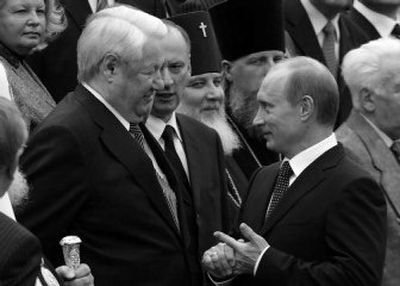Boris Yeltsin dies at 76

MOSCOW – Boris Yeltsin, the bearish peasant who struck the deathblow that shattered the Soviet Union and served as the first president of the disorderly Russia that emerged, died Monday. He was 76.
Yeltsin, who had been plagued by heart and other health problems, died of “cardiovascular insufficiency” at a Moscow hospital, Sergei Mironov, head of the medical center at the Russian presidential administration, told reporters.
President Vladimir Putin declared Wednesday a national day of mourning. The Kremlin press service announced that a memorial service would be held at Christ the Saviour Cathedral in Moscow, followed by burial Wednesday at Novodevichy cemetery, where many prominent Russians are buried.
Yeltsin was the first leader in Russian history – medieval, imperial or Soviet – to be democratically elected. He also was the first to voluntarily relinquish power, resigning on New Year’s Eve 1999 in favor of Putin.
A man of great ambition and periodic vision, Yeltsin wrenched his country out of more than seven decades of socialist economic planning and Communist Party rule.
He freed the Soviet Union’s constituent republics, creating 15 countries that stretched from Europe to China. He lifted state controls on artists, journalists, churches and scholars.
Then he, and Russia with him, floundered. Hobbled by illness, Yeltsin failed to build a prosperous and democratic nation. Economic programs backfired or ran aground. The legal system languished, and corruption and crime flourished. Rapacious businessmen bled the country of cash. He launched a ruinous war against the independence-minded republic of Chechnya in 1994.
But perhaps Yeltsin’s one unassailable achievement was that in 1991 he embarked on a political and economic transition whose scale and complexity daunted his opponents and arguably dwarfed any ever attempted. Today’s Kremlin critics look back on the Yeltsin era as one whose democratic freedoms are now being chipped away.
U.S. Defense Secretary Robert M. Gates, who happened to be in Moscow on Monday for talks with Putin on missile defense, extended his condolences to Yeltsin’s family and the Russian people. Gates, the former CIA director who worked as a Russia expert seeking to expedite the downfall of the Soviet Union, had met Yeltsin in 1992.
“No American, at least, will forget seeing him standing on the tank outside the White House, resisting the coup attempt,” Gates said. “He was an important figure in Russia’s evolution towards democracy.”
Under Yeltsin, the economy lurched from crisis to crisis. Untrained in Western-style policymaking and impatient with detail, he repeatedly promoted and demoted ministers and bureaucrats. Under their guidance, he supported a series of unpopular economic programs: shock therapy in 1991, “voucher” privatization in 1992-94, and a later series of rigged auctions in which the state’s choicest economic properties – oil and gas companies, precious metal firms and utilities – went to Kremlin insiders. Currency changes and devaluations robbed ordinary Russians of their savings more than once.
Two images capsulize his career: In August 1991, Yeltsin clambered atop a tank outside the Russian republic’s parliament, galvanizing popular resistance and squelching a coup by hard-liners seeking to overthrow Soviet President Mikhail Gorbachev. Communist rule ended within weeks; the Soviet Union within months.
More than eight years later, a bloated and contrite Yeltsin went on television and resigned, acknowledging that he had failed to deliver on his promises of democracy and prosperity.
“I want to ask your forgiveness,” Yeltsin said. “I want to apologize for not making many of our dreams come true.”
After eight years of his presidency, Russians on average were marginally better off than they had been in the Soviet period. Most of the economy had been put in private hands. The country had a stock market, a stable currency and other elements of market capitalism.
But important groups of people – pensioners, teachers, doctors and industrial workers – had seen their standard of living drop as a small class of insiders enriched themselves by legal and illegal means. Perhaps most important, Russians were rattled by the rapidity of the changes and craved a stability that never seemed to arrive.
Politically, Yeltsin took control of a country with an oversized and partially appointed parliament and left it with a democratically elected bicameral legislature. He vowed to be the first leader in Russian history not to die or be forced from office and instead turn over power to an elected successor. He fulfilled that promise in tapping Putin.
But he also thwarted democratic procedures when they worked against him, and he did not leave the choice of his successor fully up to the democratic processes he unleashed. Putin’s ascension had the trappings of elections but at heart was an abdication and coronation.
“What had seemed easy turned out to be extremely difficult,” Yeltsin admitted as he resigned. “I apologize for not justifying some of the expectations of people who believed that we could jump in one swoop from the gray, stagnant, totalitarian past to the bright, prosperous, civilized future. I believed in it myself.”